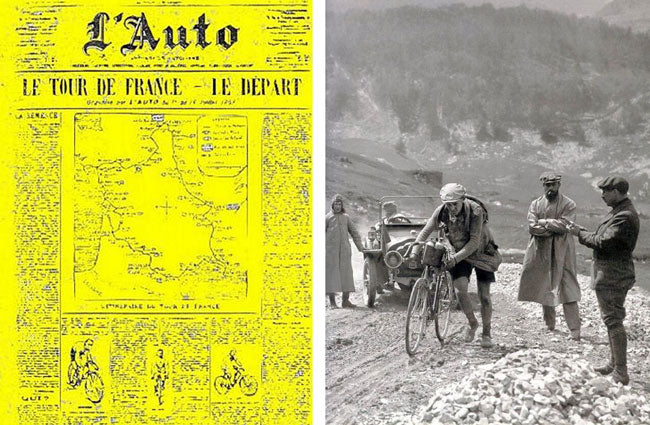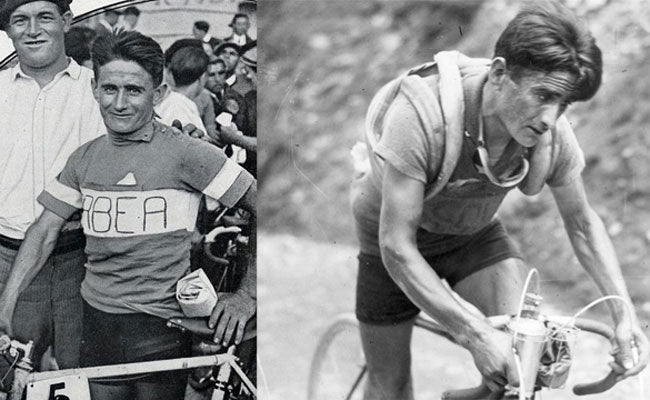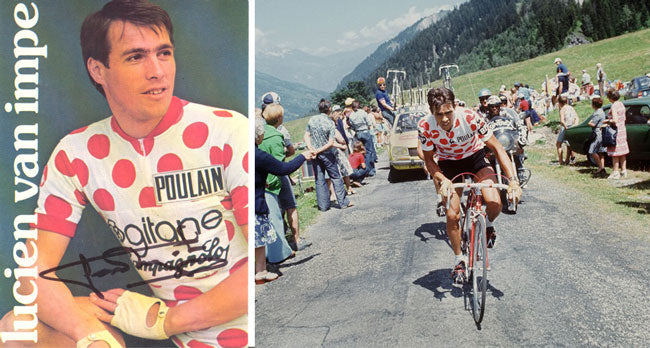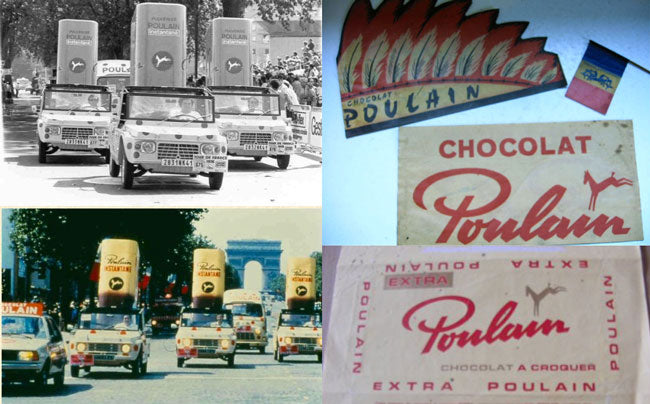Many people know the reason behind the iconic Maillot Jaune or Yellow jersey of Le Tour de France, chosen for the yellow newsprint paper of the Tour’s earliest sponsor L’Auto. Much less well know is how the King of the Mountains Jersey came to have red polka dots.
In the earliest editions of the race, no mountain passes were included on the route. In 1910 the Pyrenees col d’Aubisque & Tourmalet were included in the race. Having said that both climbs were just donkey tracks rather than proper roads. The demanding gradients and heavy, un-geared bicycles of the men who rode the Tour that year meant they had to walk the climbs and push their bikes. In the following Tour of 1911 organiser Henri Desgrange (seen below, second from right) was confident enough to include the Alps in the race.

From 1905 until the early 1930′s L’Auto selected an unofficial meilleur grimpeur ( or best climber) for each addition of the Tour. At this time Desgrange decided the riders would reached the top of the climbs first would receive additional time bonuses, this was later changed, but the King of the Mountains remained.
The first official King of the Mountains was Spanish Cyclist Vicente Trueba in 1933. Trueba was a poor descender and never gained anything in the overall general classification, but was at least recognised for his efforts in the tough climbs. Trueba was nicknamed The Flea of Torrelavega for his tiny size and his power to weight ratio, which would help him gain such and advantage on his rivals in the climbs.

It would take a World War and other few decades to pass before the King of the Mountains would receive his own jersey. In the 1975 edition of the race the Polka Dot jersey made its debut, Dutchman Joop Zoetemelk was the first rider to wear the jersey, but Belgian Lucien van Impe took it to Paris.

Now we answer the all important question, why red & white polka dots? The jersey sponsor at the time was chocolate manufacturer Chocolat Poulain – they had a red a white logo. Take a look below at one of their red and one chocolate wrappers, some vintage promotional items from the tour caravan and their caravan vehicles:

Even after Poulain ended their jersey sponsorship in the early 1990s, the polka dots, having become so iconic, were firmly here to stay!
-Lauren
In the earliest editions of the race, no mountain passes were included on the route. In 1910 the Pyrenees col d’Aubisque & Tourmalet were included in the race. Having said that both climbs were just donkey tracks rather than proper roads. The demanding gradients and heavy, un-geared bicycles of the men who rode the Tour that year meant they had to walk the climbs and push their bikes. In the following Tour of 1911 organiser Henri Desgrange (seen below, second from right) was confident enough to include the Alps in the race.

From 1905 until the early 1930′s L’Auto selected an unofficial meilleur grimpeur ( or best climber) for each addition of the Tour. At this time Desgrange decided the riders would reached the top of the climbs first would receive additional time bonuses, this was later changed, but the King of the Mountains remained.
The first official King of the Mountains was Spanish Cyclist Vicente Trueba in 1933. Trueba was a poor descender and never gained anything in the overall general classification, but was at least recognised for his efforts in the tough climbs. Trueba was nicknamed The Flea of Torrelavega for his tiny size and his power to weight ratio, which would help him gain such and advantage on his rivals in the climbs.

It would take a World War and other few decades to pass before the King of the Mountains would receive his own jersey. In the 1975 edition of the race the Polka Dot jersey made its debut, Dutchman Joop Zoetemelk was the first rider to wear the jersey, but Belgian Lucien van Impe took it to Paris.

Now we answer the all important question, why red & white polka dots? The jersey sponsor at the time was chocolate manufacturer Chocolat Poulain – they had a red a white logo. Take a look below at one of their red and one chocolate wrappers, some vintage promotional items from the tour caravan and their caravan vehicles:

Even after Poulain ended their jersey sponsorship in the early 1990s, the polka dots, having become so iconic, were firmly here to stay!
-Lauren


